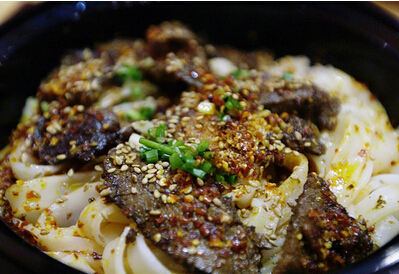(单词翻译:单击)
Within China, there's an ages-old argument over which province has the spiciest food. There's an old saying that 'Guizhou people like spiciness, Sichuan people don't fear spiciness, and Hunan people fear there is no spiciness.'
在中国,围绕哪个省份食物最辣的争议由来已久。有句老话说,贵州人爱吃辣,四川人不怕辣,湖南人怕不辣。
Fu Niu Tang, a recently opened beef noodle restaurant in Beijing, is trying to take the spicy crown for Hunan. It claims to have the world's spiciest rice noodles and is challenging patrons to finish a bowl of the signature dish in 10 minutes. Those who can finish the task are awarded with a T-shirt and a card that entitles them to a permanent 10% discount.
最近在北京开业的一家名为“伏牛堂”的牛肉面馆正努力为湖南争取“第一辣”的头衔。该餐馆声称拥有全世界最辣的米粉,而且正在举办挑战赛,邀请顾客在10分钟之内吃完一碗这样的招牌米粉。能够完成这一任务的顾客将被奖励一件T恤和一张打折卡,永久享受九折优惠。

The restaurant says the hot sauce for its rice noodles is 125 times hotter than Tabasco sauce.
伏牛堂称其米粉中的辣椒酱要比塔瓦斯科辣椒酱(Tabasco sauce)辣125倍。
So far, about 300 people have taken the spicy noodle challenge, but only 15 have been able to complete the task. Zhao Lu is one of them.
到目前为止,已有大约300人接受了吃辣米粉的挑战,但只有15人能够完成这一任务。赵路就是他们中的一个。
Mr. Zhao, 37, is originally from northeastern Shandong province--not a place particularly known for its spicy food. After paying a 35 yuan ($5.60) registration fee and signing a liability waiver, Mr. Zhao was served the bowl of rice noodles--which at first glance appear like any other regular bowl of beef noodles, with seasonings and chili sauce in the middle and green scallions sprinkled on the top.
今年37岁的赵路来自山东省,这并不是一个特别以辛辣食物闻名的地方。在缴纳了人民币35元的注册费并签署了免责协议后,有人给赵路端来了一碗牛肉米粉。第一眼看上去,这碗米粉与其他普通牛肉米粉似乎并无不同,作料和辣椒酱都在碗中央,米粉上还撒着绿色的葱花。
After two minutes, Mr. Zhao's eyes began to tear up and his hands were shaking. But he kept going, cheered on by the restaurant's other patrons. At one point, he asked a waiter for some sugar, which was allowed. He finished the noodles in eight minutes--and promptly retreated to the bathroom, where he remained for 20 minutes.
两分钟后,赵路的两眼开始流泪,双手开始颤抖。但他继续埋头大吃,其他顾客在一旁为他加油助威。吃到半截,他请服务员给他拿点糖,他的请求被接受了。他在八分钟内吃完了米粉,然后立即去了卫生间,他在那里待了20分钟。
'I had some stomach convulsions, but I'm OK now,' he said. 'I wouldn't recommend that normal people try this.'
他说:“我胃有点痉挛,这会儿好一点。”他还说:“我建议一般人不要做这种挑战。”
Asked whether he would ever give the noodles another go, he was adamant. 'No! No! No!' he said.
当被问到他是否会再来一次时,他态度坚决地说:“不!不!不!”
Zhang Tianyi, the restaurant's manager who hails from Hunan, said he had tried the noodles himself but could only finish a quarter of a bowl. 'As a local Hunanese person, I'm confident these are the spiciest beef rice noodles in the world,' he said.
这家餐馆的经理张天一是湖南人,他说他自己曾经吃过这种米粉,但只吃完了四分之一碗。他说:“作为湖南人,我相信这是世界上最辣的牛肉米粉。”
The noodles' not-so-secret ingredient is the seven-star chili, a searing off-shoot of China's popular facing-heaven chilies, so-called because they grow with their pointed ends facing upward.
这种米粉中一种并非秘密的原料是七星椒,是中国颇受喜爱的朝天椒的一种。之所以叫朝天椒,是因为它们的尖是朝上长的。
'We did a lot of research and went to the chili plantation ourselves before we decided to buy this chili--the best--there,' said Xiong Wen, an employee at the restaurant. 'These chilies are only grown in a very small part of the whole plantation, where they call it the king of chilies.'
这家餐馆的店员温雄(音)说:“我们做了很多研究,亲自去了辣椒种植园,然后才决定买这种辣椒,这种辣椒是那里最好的。”温雄还说:“这种辣椒只在整个种植园的一小片区域种植,那里的人称它为辣椒王。”
Still, it's debatable whether Hunanese food is really the spiciest in China. After all, Mr. Zhang admits, 'the farmer plants this chili in Hunan province, but they introduced it and got the seven-star chili seed from Sichuan.'
不过,湘菜是否是中国最辣的,这还值得商榷。毕竟张天一承认,湖南的农民种这种辣椒,但他们是从外地引进的,七星椒的种子来自四川。


